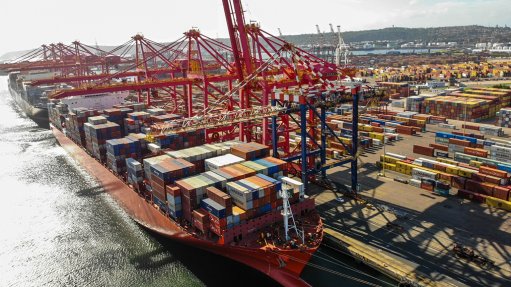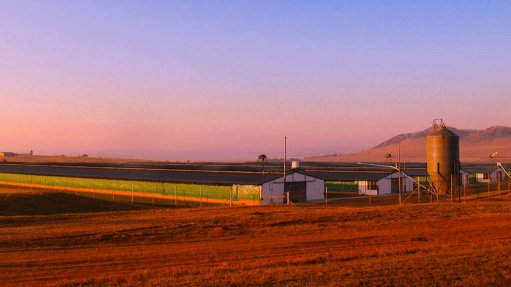Battery-powered forklift market poised for growth
This article has been supplied as a media statement and is not written by Creamer Media. It may be available only for a limited time on this website.
Over the past few years, Toyota Material Handling, a division of CFAO Equipment SA that sells forklifts and related solutions, has seen a steady increase in demand for battery-operated equipment. Typical market growth has been sitting at between 2% and 3%, mostly due to customers shifting from traditional internal combustion engine (ICE) forklifts to battery-operated forklifts.
Last year however, growth was measured at 5%, a significant increase that exceeded the division’s expectations. This increase was driven predominantly by the adoption of lithium-ion battery-operated forklifts, which are now responsible for around 80% of sales versus lead-acid battery forklifts.
“Battery technologies have come a long way in the past few years. Where lead-acid battery technology might have held back the adoption of battery-operated forklifts, due mainly to the rate of discharge and the maintenance required for these batteries, lithium-ion is now propelling the market. This has been augmented by business cycles, such as the large-scale fleet replacements that occur every three to four years,” says National Product Manager for Toyota Material Handling – Counterbalance Equipment, Brent Light.
The adoption of battery-operated forklifts is being driven by three main benefits.
Greater efficiencies and return on investment (ROI)
ICE forklifts are more expensive to run. Whereas fuel for an ICE truck costs between R20 and R25 per litre, electricity for battery-operated equipment costs just R1.50 per kilowatt. Furthermore, the per hour efficiency of an electric machine makes it more economical to run, particularly considering the virtually 100% energy efficiency of a lithium-ion battery.
“Energy consumption, and the cost of that energy, is less for an electric forklift compared to an ICE forklift. Therefore, in all applications, even though the upfront costs may be high, lithium-ion will eventually result in a cost saving. This saving can however be delayed in some very low utilisation applications, so it might not always be justifiable to the business. However, with a high or medium intensity operation, ROI will be realised fairly quickly – within 24 to 36 months you will see significant savings,” says Light.
ROI is also realised through the cost of maintenance, which is a lot less on an electric forklift. It has fewer moving components, so less can go wrong, and tyre wear is also reduced because it is almost impossible to create wheel spin.
Sustainability
As the world looks towards a more sustainable future, more businesses are being guided by regulations to reduce carbon emissions. For example, in applications such as food handling, businesses can no longer use LPG units, a stipulation of new legislation that came into effect in 2020.
ICE forklifts expel diesel and gas emissions, and a lead-acid battery emits gases when charged. With the use of lithium-ion batteries, emissions are eliminated, resulting in a cleaner and more environmentally conscious working environment.
Driver comfort
Since an electric forklift has zero vibration, and its noise levels are less than that of an ICE forklift, it is a lot more comfortable to operate.
“While we are focused on growing the electric market, most businesses still use ICE forklifts, and will do so for some time. The move towards electric forklifts is happening slowly, but as battery-powered machinery becomes more capable in handling difficult environments, adoption should speed up,” says Light.
It is important to consider that different applications require different technologies. For example, in a brickyard or concrete facility, using electric forklifts might be a drawback, as they don’t have the extra power provided by ICE forklifts, and since the work area is mainly outdoors, the emissions requirements will most likely not be as stringent.
“There are also certain applications where lead-acid battery technology is still viable, and lithium-ion potentially less. However, we do find customers moving to lithium-ion because of the maintenance benefit, even when they don't require the longer lifespan or the longer operating time of the lithium-ion battery. With lithium-ion batteries they do not need to worry about topping up water levels, and if they need to short-charge, they can do so without any impact on the battery,” says Light.
“Having a variety of forklifts available will continue to appeal to customers, and their choice of machine will depend on what it will be used for. It is important that they consider all options, and choose the most suitable machine for the application,” concludes Light.
CFAO Equipment SA is the partner of choice in the material handling market, offering total solutions and best-in-class brands in new and pre-owned equipment, rental options, and value-added services.
Comments
Announcements
What's On
Subscribe to improve your user experience...
Option 1 (equivalent of R125 a month):
Receive a weekly copy of Creamer Media's Engineering News & Mining Weekly magazine
(print copy for those in South Africa and e-magazine for those outside of South Africa)
Receive daily email newsletters
Access to full search results
Access archive of magazine back copies
Access to Projects in Progress
Access to ONE Research Report of your choice in PDF format
Option 2 (equivalent of R375 a month):
All benefits from Option 1
PLUS
Access to Creamer Media's Research Channel Africa for ALL Research Reports, in PDF format, on various industrial and mining sectors
including Electricity; Water; Energy Transition; Hydrogen; Roads, Rail and Ports; Coal; Gold; Platinum; Battery Metals; etc.
Already a subscriber?
Forgotten your password?
Receive weekly copy of Creamer Media's Engineering News & Mining Weekly magazine (print copy for those in South Africa and e-magazine for those outside of South Africa)
➕
Recieve daily email newsletters
➕
Access to full search results
➕
Access archive of magazine back copies
➕
Access to Projects in Progress
➕
Access to ONE Research Report of your choice in PDF format
RESEARCH CHANNEL AFRICA
R4500 (equivalent of R375 a month)
SUBSCRIBEAll benefits from Option 1
➕
Access to Creamer Media's Research Channel Africa for ALL Research Reports on various industrial and mining sectors, in PDF format, including on:
Electricity
➕
Water
➕
Energy Transition
➕
Hydrogen
➕
Roads, Rail and Ports
➕
Coal
➕
Gold
➕
Platinum
➕
Battery Metals
➕
etc.
Receive all benefits from Option 1 or Option 2 delivered to numerous people at your company
➕
Multiple User names and Passwords for simultaneous log-ins
➕
Intranet integration access to all in your organisation





















